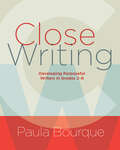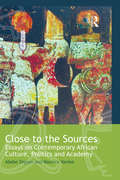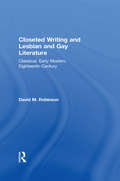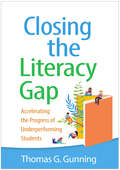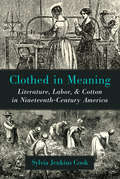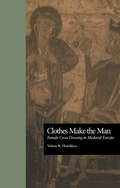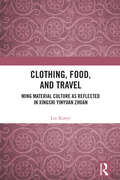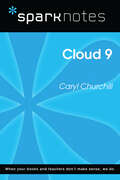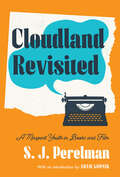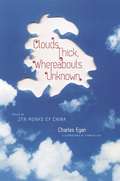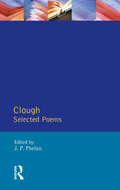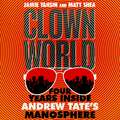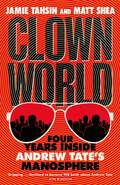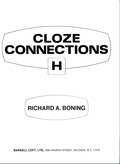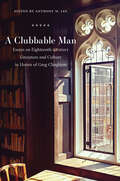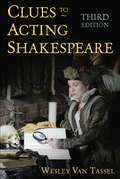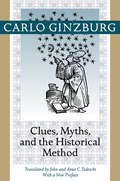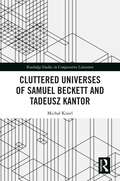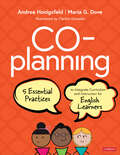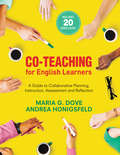- Table View
- List View
Close Writing: Developing Purposeful Writers in Grades 2-6
by Paula BourqueHow closely do your students read their writing? What are the implications for those who do and those who don't? During her work in classrooms, literacy coach Paula Bourque noticed that students who read their own writing closely are engaged in their work, write fluently, are able to produce lengthy drafts, and incorporate teaching points from mini-lessons into the day's writing. In this comprehensive book, Paula shows you that no matter what structures or lessons you use in your writing classroom, the strategies in Close Writing will help you make these better by creating student writers who are more aware of what effective writing looks like, who care about what they write, and who take ownership and responsibility for their growth as writers. Paula argues that a key element in close writing is learning to look and looking to learn by closely reading our own writing. Instead of focusing on the mechanics of their writing, she encourages students to read their words for understanding, clarity, and the effect they will have on an audience. She urges them to recognize their habits and their approaches to writing and to build upon them.Close Writing is based on research and methods that are reliable and valid best practices, but it will not prescribe lessons or structures. It gives you a peek inside classrooms where teachers just like you are working with budding authors just like yours. Paula also provides considerations for ELL writers, as well as a section of interviews with authors. She shares an extensive reference/resource guide, and a companion website with students' work samples, reproducibles and templates, and videos of classroom writing lessons round out this must-have resource.
Close to the Sources: Essays on Contemporary African Culture, Politics and Academy (Routledge African Studies)
by Abebe Zegeye Maurice VambeEuropean and African works have found it difficult to move past the image of Africa as a place of exotica and relentless brutality. This book explores the status and critical relationship between politics, culture, literary creativity, criticism, education and publishing in the context of promoting Africa’s indigenous knowledge, and seeks to recover some of the sites where Africans continue to elaborate conflicting politics of self-affirmations. It both acknowledges and steps outside the protocols of analysis informed by nationalism, differentiating the forms that postcolonial theories have taken, and arguing for a selective appropriation of theory that emerges from Africa’s lived experiences.
Closet Devotions
by Richard RambussReligion and sex, body and soul, sacred and profane: In Closet Devotions, Richard Rambuss traces the relays between these cultural formations by examining the issue of "sacred eroticism," the literary or artistic expression of devotional feelings in erotic terms that has repeatedly occurred over the centuries. Rather than dismissing such expression as mere convention, Rambuss takes it seriously as a form of erotic discourse, one that gives voice to desires that, outside the sphere of sacred rapture, would otherwise be deemed taboo.Through startling rereadings of works ranging from the devotional verse of the metaphysical poets (Donne, Herbert, Crashaw, and Traherne) to photographer Andres Serrano's controversial "Piss Christ," from Renaissance religious iconography to contemporary gay porn, Rambuss uncovers the highly charged erotic imagery that suffuses religious devotional art and literature. And he explores one of Christian culture's most guarded (and literal) closets--the prayer closet itself, a privileged space where the vectors of same-sex desire can travel privately between the worshiper and his or her God.Elegantly written and theoretically astute, Closet Devotions illuminates the ways in which sacred Christian devotion is homoeroticized, a phenomenon that until now has gone unexplored in current scholarship on religion, the body, and its passions. This book will attract readers across a wide array of disciplines, including gay and lesbian studies, literary theory and criticism, Renaissance studies, and religion.
Closeted Writing and Lesbian and Gay Literature: Classical, Early Modern, Eighteenth-Century
by David M. RobinsonArguing for renewed attention to covert same-sex-oriented writing (and to authorial intention more generally), this study explores the representation of female and male homosexuality in late sixteenth- through mid-eighteenth-century British and French literature. The author also uncovers and analyzes long-term continuities in the representation of same-sex love, sex, and desire between the classical, early modern, eighteenth-century, and even modern periods. Among the seventeenth- and eighteenth-century authors and texts examined here are Mme de Murat, Les Memoires De Madame La Comtesse De M*** (1697); John Cleland, Memoirs of a Woman of Pleasure (1748-49); Tobias Smollett, The Adventures of Roderick Random (1748); Nicolas Chorier and Jean Nicolas, L'Academie des dames (1680); Delarivier Manley, The New Atalantis (1709); and Isaac de Benserade, Iphis et Iante (1637). Classical texts brought into the discussion include Juvenal's Satires, Lucian's Erotes, and, most importantly, Ovid's Metamorphoses. Casting its net broadly yet exploring deeply-poems, plays, novels, and more; from the serious to the satiric, the polite to the pornographic; well-known and little-known; written in English, French, and Latin; published in early modern and eighteenth-century Britain and France; plus key classical texts-this study engages with the historiography of sexuality as a whole.
Closing the Literacy Gap: Accelerating the Progress of Underperforming Students
by Thomas G. GunningPacked with practical tools, this book provides K–6 educators with a research-based framework for accelerating the reading and writing growth of underperforming students. Strategies and resources are included for building foundational skills, comprehension, and vocabulary; engaging students with independent reading and periodicals; developing writing; and implementing tutoring and other extra supports. The book gives special attention to helping those most affected by the literacy gap--Black and Latinx students, students living in poverty, and students with reading disabilities. It describes dozens of high-quality intervention programs, assessments, activities, and materials, many of which can be accessed for free at the companion website. Reproducible forms and handouts can be downloaded and printed in a convenient 8 1/2" x 11" size.
Clothed in Meaning: Literature, Labor, and Cotton in Nineteenth-Century America (Class : Culture)
by Sylvia Jenkins CookThe rise of both the empire of cotton and the empire of fashion in the nineteenth century brought new opportunities for sartorial self-expression to millions of ordinary people who could now afford to dress in style and assert their physical presence. Millions of laborers toiling in cotton fields and producing cotton cloth in industrial mills faced a brutal reality of exploitation, servitude, and regimentation—yet they also had a profound desire to express their selfhood. Another transformative force of this era—the rise of literary publication and the radical extension of literacy to the working class—opened an avenue for them to do so. Cloth and clothing provide potent tropes not only for physical but also for intellectual forms of self-expression. Drawing on sources ranging from fugitive slave narratives, newspapers, manifestos, and mill workers’ magazines to fiction, poetry, and autobiographies, Clothed in Meaning examines the significant part played by mill workers and formerly enslaved people, many of whom still worked picking cotton, in this revolution of literary self-expression. They created a new literature from their palpable daily intimacy with cotton, cloth, and clothing, as well as from their encounters with grimly innovative modes of work. In the materials of their labor they discovered vivid tropes for formulating their ideas and an exotic and expert language for articulating them. The harsh conditions of their work helped foster in their writing a trenchant irony toward the demeaning reduction of human beings to “hands” whose minds were unworthy of interest. Ultimately, Clothed in Meaning provides an essential examination of the intimate connections between oppression and luxury as recorded in the many different voices of nineteenth-century labor.
Clothes Make the Man: Female Cross Dressing in Medieval Europe (New Middle Ages)
by Valerie R. HotchkissIn this book, the author explores medieval society's fascination with the cross-dressed woman. The author examines a wide variety of religious, literary, and historical sources, which record interpretations of sartorial attempts to overcome gender hierarchy and also illustrate, mainly through the device of inversion, a remarkably sustained desire to examine and reexamine the nature of social gender identities.
Clothing, Food, and Travel: Ming Material Culture as Reflected in Xingshi Yinyuan Zhuan
by Liu XiaoyiThis book explores the material and cultural history of the Ming Dynasty based on the Chinese magnum opus Xingshi Yinyuan Zhuan (literally, The Story of a Marital Fate to Awaken the World), written under the pseudonym of the seventeenth-century writer Xizhou Sheng.The novel weaves into its narrative, through the characters' personalities and the events it illustrates, important details of Ming material life. Through the literary snapshot of the Ming material culture as reflected in Xingshi Yinyuan Zhuan, this work investigates the practices and customs of clothing, food, and travel, three of the "four major concerns of the people's livelihoods," known as yishizhuxing in Chinese. While frequenting economic dimensions and probing the impact that Ming politics had on the ethos and social economy of the period, it sheds significant light on folk customs, legal and religious practices, and the status of women, among other issues. This work aims to enrich the current Western scholarship, done primarily by Timothy Brook, Craig Clunas, and Glen Dudbridge, on Ming material culture. The book will be of great value to students and scholars of East Asian Studies, Chinese literature, and those interested in the history of material culture in general.
Cloud 9 (SparkNotes Literature Guide Series)
by SparkNotesCloud 9 (SparkNotes Literature Guide) by Caryl Churchill Making the reading experience fun! Created by Harvard students for students everywhere, SparkNotes is a new breed of study guide: smarter, better, faster.Geared to what today's students need to know, SparkNotes provides:*chapter-by-chapter analysis *explanations of key themes, motifs, and symbols *a review quiz and essay topics Lively and accessible, these guides are perfect for late-night studying and writing papers.
Cloudland Revisited: A Misspent Youth in Books and Film
by S. J. PerelmanGathered for the first time: one of America's great humorists revisits the books and movies from his youth—often with some embarrassment—in this complete, 22-piece collectionFrom October 1948 to October 1953, The New Yorker published humorist S. J. Perelman&’s &“Cloudland Revisited&” series: 22 reviews of once-popular books and silent films whose expiration dates had passed. All but forgotten even at the time, they were nonetheless part of Perelman&’s youth and made an indelible mark on him.In the comic genius&’s biting satire they live once again:Gertrude Atherton&’s sensationalist fantasy Black OxenSax Rohmer&’s supervillain blockbuster The Mystery of Dr. Fu-Manchuthe &“underwater&” silent film adaptation of Twenty Thousand Leagues under the SeaEdgar Rice Burrough&’s 1914 novel Tarzan of the Apesand George Barr McCutcheon&’s 1901 historical fantasy novel Graustark—the Game of Thrones of its era—which launched numerous sequels and film adaptations The complete series is collected here for the first time. With self-deprecating humor and frequent embarrassment, Perelman reflects on how rereading and rewatching brings us in contact with how we, like an old book or film, have both changed and remained the same. This paperback includes a tribute to Perelman&’s art by another beloved New Yorker writer, Adam Gopnik.
Clouds Thick, Whereabouts Unknown: Poems by Zen Monks of China
by Charles EganCompiled by a leading scholar of Chinese poetry, Clouds Thick, Whereabouts Unknown is the first collection of Chan (Zen) poems to be situated within Chan thought and practice. Combined with exquisite paintings by Charles Chu, the anthology compellingly captures the ideological and literary nuances of works that were composed, paradoxically, to "say more by saying less," and creates an unparalleled experience for readers of all backgrounds. Clouds Thick, Whereabouts Unknown includes verse composed by monk-poets of the eighth to the seventeenth centuries. Their style ranges from the direct vernacular to the evocative and imagistic. Egan's faithful and elegant translations of poems by Han Shan, Guanxiu, and Qiji, among many others, do justice to their perceptions and insights, and his detailed notes and analyses unravel centuries of Chan metaphor and allusion. In these gems, monk-poets join mainstream ideas on poetic function to religious reflection and proselytizing, carving out a distinct genre that came to influence generations of poets, critics, and writers. The simplicity of Chan poetry belies its complex ideology and sophisticated language, elements Egan vividly explicates in his religious and literary critique. His interpretive strategies enable a richer understanding of Mahayana Buddhism, Chan philosophy, and the principles of Chinese poetry.
Clough: Selected Poems (Longman Annotated Texts)
by Arthur Hugh Clough Joseph PhelanThis volume represents a selection of some of the best poetry by Arthur Hugh Clough (1810-61). Detailed annotation provides the modern reader with the intellectual, cultural and historical information necessary for a full appreciation of the poet's work. The poems selected span Clough's entire career, with the main focus on his two most important poems, Amours de Voyage and Dipsychus and the Spirit. These poems are discussed at length in the critical introduction and are prefaced by substantial headnotes elucidating their historical background and literary antecedents. Providing a wealth of information about the poet and the context of his work, this volume represents a substantial contribution to the subject in its own right, as well as being essential reading for all students of nineteenth-century literature.
Clown World: Four Years Inside Andrew Tate's Manosphere
by Jamie Tahsin Matt Shea'This gripping book is destined to become THE book about Andrew Tate' Jon Ronson'A fascinating and disturbing investigation' Ian HislopThe behind-the-scenes story of a four-year investigation into Andrew Tate, exploring how a failed reality TV star turned accused organised criminal managed to become one of the most famous influencers in the world.In 2022, Andrew Tate went from a little-known kickboxer and failed reality TV star to a lifestyle icon for legions of men and boys, and a figure that would define a new era of misogyny. Tate started the year as a fringe internet celebrity, but by August he was the most googled man in the world. In that same month, Matt Shea and Jamie Tahsin gained access to his Bucharest compound and infamous War Room, making a documentary that would result in the first women coming forward to accuse him publicly of sexual and physical violence. Tate would end the year in a Romanian jail, facing charges of human trafficking, rape and being part of an organised crime group. But the investigations wouldn't stop there.Part Gonzo journalism, part masculinity rabbit hole, this book takes you on Shea and Tahsin's journey to reveal the dark secrets of Andrew Tate, the machine that brought him here, and the ideology he has unleashed on a generation of young men.'A sobering, strange and eye-opening look into the toxic manosphere. It should be required reading for anybody worried about the rise of incel culture and Andrew Tate' Zing Tsjeng'Rarely have I read anything so politically important that's also so gripping' Zoe Williams
Clown World: Four Years Inside Andrew Tate's Manosphere
by Jamie Tahsin Matt Shea'This gripping book is destined to become THE book about Andrew Tate' Jon Ronson'A fascinating and disturbing investigation' Ian HislopThe behind-the-scenes story of a four-year investigation into Andrew Tate, exploring how a failed reality TV star turned accused organised criminal managed to become one of the most famous influencers in the world.In 2022, Andrew Tate went from a little-known kickboxer and failed reality TV star to a lifestyle icon for legions of men and boys, and a figure that would define a new era of misogyny. Tate started the year as a fringe internet celebrity, but by August he was the most googled man in the world. In that same month, Matt Shea and Jamie Tahsin gained access to his Bucharest compound and infamous War Room, making a documentary that would result in the first women coming forward to accuse him publicly of sexual and physical violence. Tate would end the year in a Romanian jail, facing charges of human trafficking, rape and being part of an organised crime group. But the investigations wouldn't stop there.Part Gonzo journalism, part masculinity rabbit hole, this book takes you on Shea and Tahsin's journey to reveal the dark secrets of Andrew Tate, the machine that brought him here, and the ideology he has unleashed on a generation of young men.'A sobering, strange and eye-opening look into the toxic manosphere. It should be required reading for anybody worried about the rise of incel culture and Andrew Tate' Zing Tsjeng'Rarely have I read anything so politically important that's also so gripping' Zoe Williams
Clown World: Four Years Inside Andrew Tate's Manosphere
by Jamie Tahsin Matt Shea'This gripping book is destined to become THE book about Andrew Tate' Jon Ronson'A fascinating and disturbing investigation' Ian HislopThe behind-the-scenes story of a four-year investigation into Andrew Tate, exploring how a failed reality TV star turned accused organised criminal managed to become one of the most famous influencers in the world.In 2022, Andrew Tate went from a little-known kickboxer and failed reality TV star to a lifestyle icon for legions of men and boys, and a figure that would define a new era of misogyny. Tate started the year as a fringe internet celebrity, but by August he was the most googled man in the world. In that same month, Matt Shea and Jamie Tahsin gained access to his Bucharest compound and infamous War Room, making a documentary that would result in the first women coming forward to accuse him publicly of sexual and physical violence. Tate would end the year in a Romanian jail, facing charges of human trafficking, rape and being part of an organised crime group. But the investigations wouldn't stop there.Part Gonzo journalism, part masculinity rabbit hole, this book takes you on Shea and Tahsin's journey to reveal the dark secrets of Andrew Tate, the machine that brought him here, and the ideology he has unleashed on a generation of young men.'A sobering, strange and eye-opening look into the toxic manosphere. It should be required reading for anybody worried about the rise of incel culture and Andrew Tate' Zing Tsjeng'Rarely have I read anything so politically important that's also so gripping' Zoe Williams
Clowning and Authorship in Early Modern Theatre
by Richard PreissTo early modern audiences, the 'clown' was much more than a minor play character. A celebrity performer, he was a one-man sideshow whose interactive entertainments - face-pulling, farce interludes, jigs, rhyming contests with the crowd - were the main event. Clowning epitomized a theatre that was heterogeneous, improvised, participatory, and irreducible to dramatic texts. How, then, did those texts emerge? Why did playgoers buy books that deleted not only the clown, but them as well? Challenging the narrative that clowns were 'banished' by playwrights like Shakespeare and Jonson, Richard Preiss argues that clowns such as Richard Tarlton, Will Kemp, and Robert Armin actually made playwrights possible - bridging, through the publication of their routines, the experience of 'live' and scripted performance. Clowning and Authorship tells the story of how, as the clown's presence decayed into print, he bequeathed the new categories around which theatre would organize: the author, and the actor.
Cloze Connections: Book H
by Richard A. BoningCloze Connections has been developed primarily to improve reading comprehension. The pupil's task is to identify the exact words that have been deleted. In identifying the correct deletions the pupils must relate the whole to the part and the part to the whole. The pupils de¬pend upon their insight into the interrelationship of ideas. They must blend semantic and syntactic clues in order to choose the most appropriate responses. The deletion of words from a passage requires the pupils to pay more attention to the message of the passage as con¬veyed by the remaining cue words.
Clubbable Man: Essays on Eighteenth-Century Literature and Culture in Honor of Greg Clingham
by David Hopkins Antjie Krog Harry Thomas Margaret Williams John Richetti Philip Smallwood Adam Rounce Kate Parker Elaine Wood Clement Hawes James Rice Daniel Little Gordon Turnbull Adam Walker Kevin L. Cope Anthony W Lee Cedric D. II Bärbel Czennia Robert G. Walker Aaron R. Hanlon Martine Brownley Dominic Jermey Caroline Fassett Joseph McNicholas Erin Labbie Patrick Thomas Henry Kang Tchou Gary Sojka Nina Forsberg John Rickard Kieron Winn Emily GrosholzSamuel Johnson famously referred to his future biographer, the unsociable magistrate Sir John Hawkins, as “a most unclubbable man." Conversely, this celebratory volume gathers distinguished eighteenth-century studies scholars to honor the achievements, professional generosity, and sociability of Greg Clingham, taking as its theme textual and social group formations. Here, Philip Smallwood examines the “mirrored minds” of Johnson and Shakespeare, while David Hopkins parses intersections of the general and particular in three key eighteenth-century figures. Aaron Hanlon draws parallels between instances of physical rambling and rhetorical strategies in Johnson’s Rambler, while Cedric D. Reverand dissects the intertextual strands uniting Dryden and Pope. Contributors take up other topics significant to the field, including post-feminism, travel, and seismology. Whether discussing cultural exchange or textual reciprocities, each piece extends the theme, building on the trope of relationship to organize and express its findings. Rounding out this collection are tributes from Clingham’s former students and colleagues, including original poetry.
Clues to Acting Shakespeare
by Wesley Van TasselClues to Acting Shakespeare has become a popular guide for actors, directors, teachers and Shakespeare enthusiasts, selling over 15,000 copies of previous editions. This third edition retains the second edition’s unique solutions to challenges that face directors and actors at advanced levels and is expanded to include an entirely new section for amateur and community theatre groups. In this new edition, readers will be delighted to find: New section to aid community theatres to perform Shakespeare’s plays, including five recorded workshops of community theatre actors coached and trained by the author Updates to the successful sections on training student actors (MFA and BFA programs), and professional actors (including audition tips)—highlighted by twenty author-coached workshops with professional and advanced student actors Improved section for teachers of high school and child actors with worksheets and sample lesson plans New exercises and resources for all levels of acting and production To aid professionals, Clues to Acting Shakespeare offers a one-day brush-up for auditions and preparation to play Shakespeare immediately. Text analysis, character studies, and both classical British training and American methods are explored. The exercises and recorded workshops provide inspiring advice to all actors and demonstrate concepts discussed throughout the book. The critical skills required for acting Shakespeare, including scansion, phrasing, caesura, breathing, speech structure, antithesis, and more are covered in detail. The comprehensive exercises using the Bard’s plays and sonnets teach actors to break down the verse, support the words, understand the imagery, and use the text to create vibrant performances.
Clues, Myths, and the Historical Method
by Carlo GinzburgCarlo Ginzburg considers how we assign historical context to events.More than twenty years after Clues, Myths, and the Historical Method was first published in English, this extraordinary collection remains a classic. The book brings together essays about Renaissance witchcraft, National Socialism, sixteenth-century Italian painting, Freud’s wolf-man, and other topics. In the influential centerpiece of the volume Carlo Ginzburg places historical knowledge in a long tradition of cognitive practices and shows how a research strategy based on reading clues and traces embedded in the historical record reveals otherwise hidden information. Acknowledging his debt to art history, psychoanalysis, comparative religion, and anthropology, Ginzburg challenges us to retrieve cultural and social dimensions beyond disciplinary boundaries.In his new preface, Ginzburg reflects on how easily we miss the context in which we read, write, and live. Only hindsight allows some understanding. He examines his own path in research during the 1970s and its relationship to the times, especially the political scenes of Italy and Germany. Was he influenced by the environment, he asks himself, and if so, how? Ginzburg uses his own experience to examine the elusive and constantly evolving nature of history and historical research.
Cluttered Universes of Samuel Beckett and Tadeusz Kantor (Routledge Studies in Comparative Literature)
by Michał KisielCluttered Universes of Samuel Beckett and Tadeusz Kantor is a collection of four essays bringing Kantor’s and Beckett’s texts, theatres, and theories into conversation with deconstruction, new materialism, environmental humanities, and posthumanism. This book is dedicated to two artists rarely discussed together to see how their awareness of poetics and performativity of matter might help us understand our connection to the material world, even if the world is falling apart. Jane Bennett, Karen Barad, Rosi Braidotti, Donna Haraway, Timothy Morton, and others pave the way for new critical interpretations of canonical works, which are recognised as universes “cluttered” with matter, objects, things, and other nonhuman visitors of seemingly exclusive human domains. Kisiel shows that Beckett’s and Kantor’s carefulness and care for imagining nonhuman/human relationships might refresh our understanding of memory, togetherness, death, or even the end of the world for the Anthropocene.
Co-Planning: Five Essential Practices to Integrate Curriculum and Instruction for English Learners
by Maria G. Dove Andrea HonigsfeldPool your collective wisdom in support of your English learners! English Learners (ELs) and multilingual learners (MLs) have double the work of their English-speaking peers as they are required to master language and content simultaneously. To support this dynamic academic and language development process, all teachers need to have an understanding of language acquisition and EL/ML-specific methodologies along with offering social-emotional support to ELs/MLs and work in tandem with each other. Bestselling authors Andrea Honigsfeld and Maria G. Dove have returned with this new resource that complements and expands on their previous titles on co-teaching and collaboration by addressing collaborative planning in greater depth. Co-planning is positioned as the first step toward integrative language and content instruction as regular and purposeful collaboration ensures that Els/MLs have access to core content. Key features include: • Practical, step-by-step guidance to starting and sustaining collaborative planning for integrated language, literacy, and social-emotional development • An array of checklists, templates, and protocols for immediate implementation • Snapshots from the Field provide real-life examples of co-planning in action • Beautiful full-color design with original sketch notes to bring concepts to life • QR codes that link to author interviews elaborating on key ideas This substantial guide will assist novice and seasoned educators alike in their move away from isolated practices and help them engage in collaborative planning and professional dialogue about asset-based, best practices for ELs/MLs.
Co-Planning: Five Essential Practices to Integrate Curriculum and Instruction for English Learners
by Maria G. Dove Andrea HonigsfeldPool your collective wisdom in support of your English learners! English Learners (ELs) and multilingual learners (MLs) have double the work of their English-speaking peers as they are required to master language and content simultaneously. To support this dynamic academic and language development process, all teachers need to have an understanding of language acquisition and EL/ML-specific methodologies along with offering social-emotional support to ELs/MLs and work in tandem with each other. Bestselling authors Andrea Honigsfeld and Maria G. Dove have returned with this new resource that complements and expands on their previous titles on co-teaching and collaboration by addressing collaborative planning in greater depth. Co-planning is positioned as the first step toward integrative language and content instruction as regular and purposeful collaboration ensures that Els/MLs have access to core content. Key features include: • Practical, step-by-step guidance to starting and sustaining collaborative planning for integrated language, literacy, and social-emotional development • An array of checklists, templates, and protocols for immediate implementation • Snapshots from the Field provide real-life examples of co-planning in action • Beautiful full-color design with original sketch notes to bring concepts to life • QR codes that link to author interviews elaborating on key ideas This substantial guide will assist novice and seasoned educators alike in their move away from isolated practices and help them engage in collaborative planning and professional dialogue about asset-based, best practices for ELs/MLs.
Co-Teaching for English Learners: A Guide to Collaborative Planning, Instruction, Assessment, and Reflection
by Maria G. Dove Andrea Honigsfeld"Dove and Honigsfeld′s new book arrives at the perfect time as an increasing number of schools move to a collaborative instructional model and are searching for guidance. The authors not only tell us how to effectively collaborate and co-teach to benefit English learners, they actually show us what each component of the collaborative instructional cycle looks and feels like, complemented by innovative video and web content." —DIANE STAEHR FENNER, Coauthor of Unlocking ELs’ Potential and President of SupportEd Because teacher collaboration isn’t an option, it’s a MUST! The proof is borne out by any assessment: our non-native speakers learn faster and achieve more when general ed teachers and EL specialists co-plan and co-deliver instruction in the very same classroom. That’s why you’ll want to put Co-Teaching for English Learners at the top of your reading list. Step by step, EL authorities Maria Dove and Andrea Honigsfeld walk you through the entire collaborative instruction cycle, along with seven potential classroom configurations from which to choose. Whether you’re new to co-teaching or just see room for improvement in your practice, this practical handbook delivers every technique and tool you need to make the most of your collaboration, including video footage of co-teaching in action. Inside you’ll find: • In-depth profiles of the seven models, with detailed descriptions and analyses • A review of advantages and challenges of each model’s implementation • Clear explanations of each teacher’s role along with self-assessment tools • Tried-and-true strategies for the entire instructional cycle: co-planning, co-instruction, co-assessment, and reflection • Real-life accounts from co-teaching veterans Long gone are the days when our ELs are taught in isolation—and rightfully so. Read Co-Teaching for English Learners, implement its strategies, and soon enough you, too, can set up a learning environment in which all students thrive.
Co-Teaching for English Learners: A Guide to Collaborative Planning, Instruction, Assessment, and Reflection
by Maria G. Dove Andrea Honigsfeld"Dove and Honigsfeld′s new book arrives at the perfect time as an increasing number of schools move to a collaborative instructional model and are searching for guidance. The authors not only tell us how to effectively collaborate and co-teach to benefit English learners, they actually show us what each component of the collaborative instructional cycle looks and feels like, complemented by innovative video and web content." —DIANE STAEHR FENNER, Coauthor of Unlocking ELs’ Potential and President of SupportEd Because teacher collaboration isn’t an option, it’s a MUST! The proof is borne out by any assessment: our non-native speakers learn faster and achieve more when general ed teachers and EL specialists co-plan and co-deliver instruction in the very same classroom. That’s why you’ll want to put Co-Teaching for English Learners at the top of your reading list. Step by step, EL authorities Maria Dove and Andrea Honigsfeld walk you through the entire collaborative instruction cycle, along with seven potential classroom configurations from which to choose. Whether you’re new to co-teaching or just see room for improvement in your practice, this practical handbook delivers every technique and tool you need to make the most of your collaboration, including video footage of co-teaching in action. Inside you’ll find: • In-depth profiles of the seven models, with detailed descriptions and analyses • A review of advantages and challenges of each model’s implementation • Clear explanations of each teacher’s role along with self-assessment tools • Tried-and-true strategies for the entire instructional cycle: co-planning, co-instruction, co-assessment, and reflection • Real-life accounts from co-teaching veterans Long gone are the days when our ELs are taught in isolation—and rightfully so. Read Co-Teaching for English Learners, implement its strategies, and soon enough you, too, can set up a learning environment in which all students thrive.
